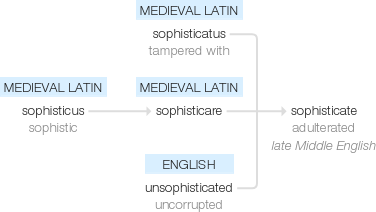Sophistication
late Middle English (as an adjective in the sense ‘adulterated’, and as a verb in the sense ‘mix with a foreign substance’): from medieval Latin sophisticatus ‘tampered with’, past participle of the verb sophisticare, from sophisticus ‘sophistic’. The shift of sense probably occurred first in the adjective unsophisticated, from ‘uncorrupted’ via ‘innocent’ to ‘inexperienced, uncultured’. The noun dates from the early 20th century.
wiktionary
sophisticate + -ion
etymonline
sophistication (n.)
early 15c., "use of sophistry; fallacious argument intended to mislead; adulteration; an adulterated or adulterating substance," from Medieval Latin sophisticationem (nominative sophisticatio), noun of action from past-participle stem of sophisticare "adulterate, cheat quibble," from Latin sophisticus "of sophists," from Greek sophistikos "of or pertaining to a sophist," from sophistes "a wise man, master, teacher" (see sophist). Greek sophistes came to mean "one who gives intellectual instruction for pay," and at Athens, contrasted with "philosopher," it became a term of contempt.
Meaning "worldly wisdom, refinement, discrimination" is attested from 1850.
